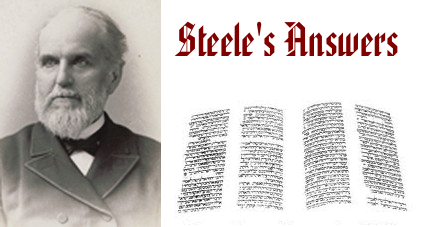"And the God of peace himself sanctify you wholly; and may your spirit and soul and body be preserved entire, without blame at the coming of our Lord Jesus Christ. Faithful is he that calleth you, who will also do it." (1 Thessalonians 5:23, 24 ASV.)
1 Thess. 5:23 is a text which implies that the regenerate are not entirely purified, and that they may be in answer to prayer. This implies that it is in this life. The expanded "amen" after this prayer "Faithful is he that calleth you, who will also do it," is a declaration that it is God, and not death, who is the author of this work.
There is an important word, ὁλοτελής (
holoteles), which is found nowhere else in the New Testament nor in the Septuagint. It is an adjective in form with an adverbial meaning (Kuhner, 264.3). If Paul intended to pray that the Thessalonians might all be sanctified, there were three everyday adjectives which he might have used to express "all." He employed this unique term, meaning "wholly to the end," or "quite completely," because he had realized in his own experience the uttermost sanctification, and he saw that it was the privilege of every believer. This rare and peculiar word is rendered in the Vulgate
per omnia, "in your collective powers and parts." "Marking," says Ellicott, "more emphatically that thoroughness and pervasive holiness which the following words specify with further exactness." He thus translates it: "But may the God of peace himself sanctify you wholly, and may your spirit and soul and body be preserved whole without blame in the coming of our Lord Jesus Christ." A Greek version of the Old Testament was made by Aquila in which this word occurs in Deut. 13:16, to express the idea of "every whit." We have been explicit in defining this word as indicating the completeness of individual sanctification which is presently presented in detail, and not the cleansing of the totality of the Thessalonian church — may God sanctify you all. Of course the apostle's prayer for the entire purification of the individual includes every individual in the church.
But there is another word in this verse that occurs nowhere else in the New Testament except in James 1:4. It is ὁλόκληρον (
holoklaron), "whole," an emphatic predicate referring to all three following substantives — spirit, soul, and body. The SPIRIT is the highest and distinctive part of man, his real personality, responsible and naturally immortal, whereby we are receptive of the Holy Spirit through saving faith in Jesus Christ. In the unregenerate it is crushed down and subordinated to the animal soul, the seat of the passions and desires which we have in common with the brutes. The next component of man, for the entire sanctification of which Paul prays, is the body, the material envelope of the immaterial personality and its animal propensities. He says much in his epistles about the sanctification of the body, "Know ye not that your bodies are members of Christ? Know ye not that your body is a temple of the Holy Ghost? glorify God therefore in your body." — 1 Cor. 6:15-20, R.V. The body is sanctified wholly when its members are used by the rectified will only "as instruments of righteousness unto God." Paul in this detailed sanctification leaves no more place for sin continuing till death than he does in 2 Cor. 7:1, where "all filthiness of the flesh and of the spirit" is to be cleansed in the act of "perfecting holiness." This word for "whole" which Paul has used only in this place signifies intact, possessing all that belongs to it, and having nothing superfluous. Sin is an excrescence, a deformity which this particular word excludes.
In conclusion, on this point we would say that the spirit is preserved blameless in its wholeness when the voice of truth always rules it; the soul when it resists all the charms of the senses; and, lastly, the body when it is not abused as the instrument of shameful actions.
— edited from Half-Hours With St. Paul, Chapter 16.
